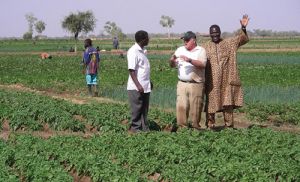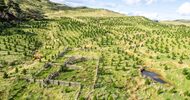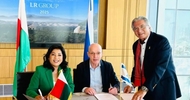This Day
A UNITED Arab Emirates (UAE) company is seeking a 98-year lease on vast tracts of farmland in Tanzania to grow rice in order to secure food supplies for the Gulf countries. Pharos Miro Agriculture Fund, which was launched in November last year, plans to lay hands on 50,000 hectares of prime land in Tanzania this year. According to media reports from the Gulf, the private sector fund is to invest $350m in farmland across Africa and Europe. The company says it has attracted interest from Gulf sovereign wealth funds seeking to secure food supplies, an executive told Reuters last week. Gulf countries, mainly reliant on food imports, have increased efforts to buy or lease land in developing nations such as Tanzania to secure food supplies and minimize the impact of food inflation. Pharos Miro Agriculture Fund is a joint venture between UAE-based Pharos Financial Group and Miro Holdings International, which is headquartered in London. "So far we have received a lot of interest from international investors, particularly sovereign wealth funds in the Gulf region, in addition to pension funds elsewhere," Pharos Financial Group managing director John Papesh told Reuters in an interview. A road show to promote the fund has included visits to Abu Dhabi, Saudi Arabia and Bahrain, in addition to Singapore and the United States. Food prices have risen sharply over the past year, prompting government and private sector firms in the Middle East to look into ways of securing supplies, as the majority of the food in the region is imported. "There is quite a bit of demand as farmland is an asset class, because investors realize that food demand is on the rise as the global population increases," said Papesh. The fund will target areas of land in Africa and Eastern Europe for the production of agricultural commodities such as rice, barley, wheat, oilseeds and animal fodder, Miro chief executive Oliver Barnes said. He added: "We are in the process of leasing 50,000 hectares of land in Tanzania which will be ready by the end of this year and will mainly be used for rice production." The Tanzanian contract will be on a 98-year lease basis and includes terms under which the local community will benefit from the farm's produce and employment opportunities will be created, Barnes added. He declined to disclose the cost of the deal, but noted: "Many people think that land in Africa is cheap, but it's not because you have to invest in infrastructure which is not there, thus costing around $1,500-2,000 per hectare." In Eastern Europe the company will be able to have freehold rights over the land which roughly costs around $2,000 per hectare, said Barnes, adding: "We are looking for land across that area in countries like Romania, Bulgaria and Moldova and this will give a good mix for the portfolio to have land in both Africa and Europe." The fund announced last year that crops from Eastern Europe would be mainly sold to the Middle East while from land acquired in Africa the crops would be sold domestically. Over the past two years, a number of Gulf states have announced plans to buy land in developing nations. In many cases these plans have failed due to opposition from local communities. Said Barnes: "This is why investing through a fund like this would give sovereign wealth funds a new channel of investment, without having to deal with all the other risks or even disclose their identity publicly, to avoid creating a frenzy.” Last year, the United Nations expressed concern that farmers' rights in Tanzania and other developing nations could become compromised as rich countries buy farmland. The head of the UN Food and Agriculture Organization, Jacques Diouf, has warned that the controversial rise in land deals could create a form of "neo-colonialism", with poor states producing food for the rich at the expense of their own hungry people. Rising food prices have already set off a second "scramble for Africa". "These deals can be purely commercial ventures on one level, but sitting behind it is often a food security imperative backed by a government," said Carl Atkin, a consultant at Bidwells Agribusiness, a Cambridge firm helping to arrange some of the big international land deals. At a food security summit in Rome in 2008, there was agreement to channel more investment and development aid to African farmers to help them respond to higher prices by producing more. But governments and corporations in some cash-rich but land-poor states, mostly in the Middle East, have opted not to wait for world markets to respond and are trying to guarantee their own long-term access to food by buying up land in poorer countries. Eager buyers generally have been welcomed by sellers in developing world governments desperate for capital in a recession. Madagascar's land reform minister said revenue would go to infrastructure and development in flood-prone areas. "If this was a negotiation between equals, it could be a good thing. It could bring investment, stable prices and predictability to the market," said Oxfam's head of research Duncan Green. "But the problem is, in this scramble for soil I don't see any place for the small farmers." Alex Evans, from the Centre of International Cooperation at New York University, said: "The small farmers are losing out already. People without solid title are likely to be turfed off the land." Details of many key land deals have been kept secret so it is unknown whether they have built-in safeguards for local populations. There has also been a considerable land grab in Tanzania for foreign companies investing in bio-fuels at the expense of local food production.Who's involved?
Whos Involved?
Carbon land deals
Dataset on land deals for carbon plantations
Languages
- Amharic
- Bahasa Indonesia
- Català
- Dansk
- Deutsch
- English
- Español
- français
- Italiano
- Kurdish
- Malagasy
- Nederlands
- Português
- Suomi
- Svenska
- Türkçe
- العربي
- 日本語
Special content
Archives
Latest posts
-

Obsolètes, les réformes agraires ?
- CETRI
- 12 June 2025













